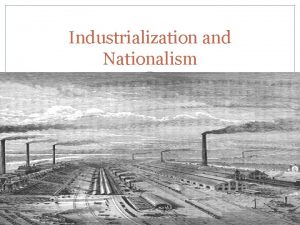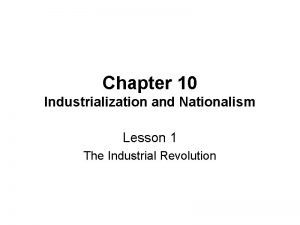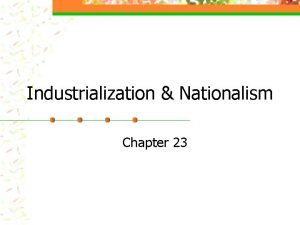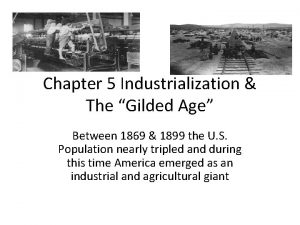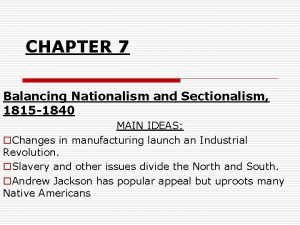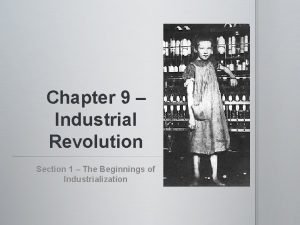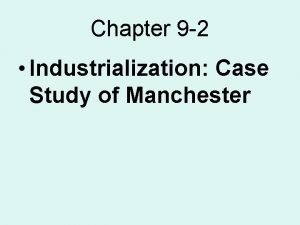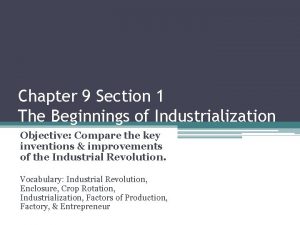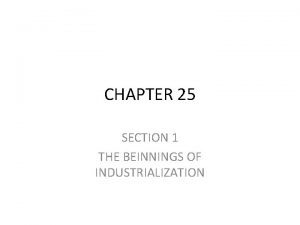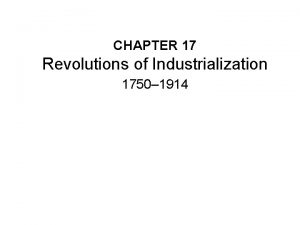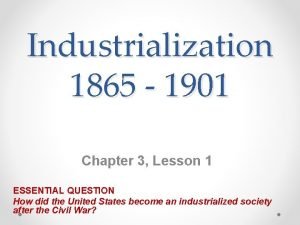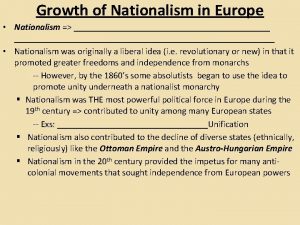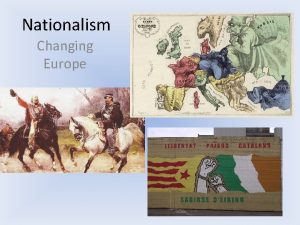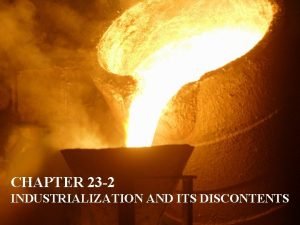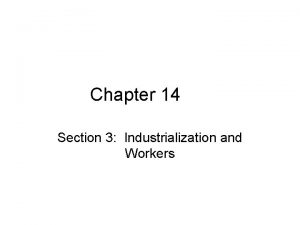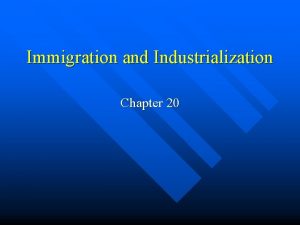CHAPTER 23 Industrialization and Nationalism Lesson 1 The
























- Slides: 24

CHAPTER 23 Industrialization and Nationalism Lesson 1 – The Industrial Revolution Begins

The Industrial Revolution Begins During the late 18 th century, the Industrial Revolution began in Great Britain Resulted in a shift in economy – from being based on farming & hand-made goods, to machine manufacturing

Earlier in the 18 th century, Britain led the world in the production of inexpensive textiles (cotton cloth) A process where women spun the cotton into thread & others wove thread into cloth Did this in their homes, (cottages), known as a Cottage Industry

Several advances in the spinning & weaving processes made it more efficient for the women to gather in one large place to work Factories were located by water since it was the source of power until 1782

A Scottish engineer, James Watt made great improvements to the steam engine

Before long, cotton mills, with steam powered machines were all over Britain Other products began to be produced using similar technology

The Factory System the use of machines powered by water, steam, or (later) electricity to manufacture goods Featured: 1. Use of unskilled labor 2. Centralized machinery under one roof 3. Standardization of parts used in the machines

The Industrial Revolution began in Great Britain in the 1780’s Didn’t spread to other nations till later what made Britain the ideal starting place?

1. Agricultural improvements – more food was being produced with less labor 2. Population growth – due to increased food, the population grew & able to purchase manufactured products 3. Natural resources: coal & iron ore were plentiful

Many rivers made it easier to transport goods

4. Wealthy investors: Britain had many entrepreneurs willing to invest in new factories & machines for huge profits (or sometimes, losses) 5. Overseas Markets: w/Britain’s vast colonial empire, goods shipped & sold all over the world 6. Domestic markets increased as more people wanted goods 7. Free Enterprise System: Government placed few restrictions & regulations on the producers & sellers Allowed great expansion of the economy & encouraged more investment

Railroads were a critical advancement in the early 1800’s because: 1. Transport of goods – great amounts raw materials & finished goods moved at once & also moved over land 2. Efficiency: as railroads improved, goods could be moved quickly & with less cost

3. Products improved: manufactured goods were a) Standardized b) Made more quickly c) More available d) Lower priced 4. Provided employment: many jobs created for workers to build railroads, work in factories & sell products

The Spread of Industrialization Great Britain was the first nation to industrialize It also made it the wealthiest nation in the world Later, Belgium, France & Germany industrialized as well But the 2 nd country to benefit from industrialization was the United States

The Spread of Industrialization By the mid-19 th century, (by 1860) the U. S. had: 1) Grown from 5 million people (in 1800) to 30 million 2) Eight cities had populations of over 100, 000 3) 50% of Americans were farmers 4) 30, 000 miles of railroad tracks

Social Impact of Industrialization Society was greatly changed by industrialization: 1. 2 new classes: 1) Emerged the industrial middle class 2) The industrial working class 2. Huge population growth (decline in death rates) a) less wars b) Less major epidemics c) better food supply

Social Impact of Industrialization 3. Mass migrations: many Europeans moved to the U. S. 4. Urbanization: millions moved to cities to work in the factories-led to horrible living conditions: a) Crowded tenements (apartments) often held 2 -3 families in small area

Social Impact of Industrialization b) Pollution from the factories c) Sanitation was very poor because of a lack of sewage & adequate water systems

Social Impact of Industrialization Working Conditions: 1. Long hours: sometimes 12 -16 hours with rare days off 2. Extreme danger: mines with cave-ins, explosions & deadly fumes Factories had dangerous machines could amputate fingers, hands & arms

Social Impact of Industrialization 3. No employment security – workers could be fired at will beaten or punished No insurance if they were injured or killed

Social Impact of Industrialization 4. Women & children: as young as 6 -7 worked long hours in the textile mills Neither received the same wages as men

Social Impact of Industrialization The conditions eventually resulted in many social movements to end the abuses & to protect workers Industrial Capitalism: an economic system based on industrial production – came to be viewed by some as unfair Why?

Social Impact of Industrialization Because some made huge profits while the workers made low wages

Social Impact of Industrialization The abuses of the Industrial Revolution gave rise to a new movement & economic system - Socialism which adhered to: 1) Government ownership – all means of production - factories, utilities & businesses 2) Government control all parts of the economy including profits, wages, prices, production & jobs 3) Class-less society – Everyone shares equally in what is produced & would share equally in the profits
 Lesson quiz 10-2 industrialization and nationalism answers
Lesson quiz 10-2 industrialization and nationalism answers Chapter 10 lesson 1 the industrial revolution
Chapter 10 lesson 1 the industrial revolution Industrialization and nationalism chapter 23
Industrialization and nationalism chapter 23 -have strength to match the growth of industrialization
-have strength to match the growth of industrialization Chapter 23 lesson 3 nationalism unification and reform
Chapter 23 lesson 3 nationalism unification and reform Nationalism and political revolutions lesson 2
Nationalism and political revolutions lesson 2 Lesson 5 - industrialization
Lesson 5 - industrialization Lesson 3 - big business and government
Lesson 3 - big business and government Indian independence lesson plan
Indian independence lesson plan Chapter 35 nationalism and political identities in asia
Chapter 35 nationalism and political identities in asia Chapter 36 nationalism and political identities in asia
Chapter 36 nationalism and political identities in asia Russian revolution vocabulary
Russian revolution vocabulary Samuel slater and eli whitney pioneered what
Samuel slater and eli whitney pioneered what Chapter 25 section 3 industrialization spreads
Chapter 25 section 3 industrialization spreads Chapter 9 section 3 industrialization spreads answer key
Chapter 9 section 3 industrialization spreads answer key Chapter 9 section 3 industrialization spreads answer key
Chapter 9 section 3 industrialization spreads answer key Power loom industrial revolution
Power loom industrial revolution Industrialization case study manchester
Industrialization case study manchester The beginning of industrialization chapter 9 section 1
The beginning of industrialization chapter 9 section 1 Chapter 25 section 2 industrialization
Chapter 25 section 2 industrialization Chapter 17 revolutions of industrialization
Chapter 17 revolutions of industrialization Industrialization 1865 to 1901
Industrialization 1865 to 1901 Chapter 29: nationalism around the world answers
Chapter 29: nationalism around the world answers Chapter 7 section 2 nationalism at center stage
Chapter 7 section 2 nationalism at center stage Chapter 23 the age of nationalism
Chapter 23 the age of nationalism
